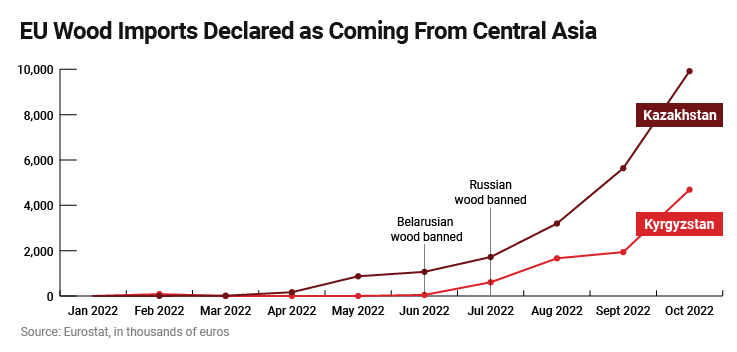Traders are sneaking banned Russian and Belarusian wood into the EU by pretending it’s from Central Asia, according to the Organized Crime and Reporting Project (OCCRP).
According to the report, not long after imposing sanctions on wood imports from Russia and Belarus, Europe saw an influx of wood supposedly coming from Kazakhstan and Kyrgyzstan. These “sanctions-buster” traders are increasingly mislabeling wood as Central Asian so they can keep bringing it into the EU.
When the European Union banned imports of wood from Russia and Belarus — two of the bloc’s top suppliers — in response to the invasion of Ukraine, the measure promised to wipe billions of euros from their budgets.
But a new investigation by the OCCRP and its journalism partners the Belarusian Investigative Center (BIC) in Belarus, and Siena in Lithuania, shows that some wood companies are evading these restrictions using misleading paperwork claiming their shipments come from Kazakhstan or Kyrgyzstan.
OCCRP, the BIC and Siena approached several companies they suspected of being part of the illicit trade in Belarusian wood and posed as potential clients.
On paper, the reporters found that the EU’s imports of wood from the two Central Asian states have surged from around 445,000 euros’ worth in 2020 and 2021 to over 30 million euros between June and October 2022 alone, after the sanctions started to be enforced. Yet Kazakhstan and Kyrgyzstan have few forests — trees cover less than 6 percent of their terrain — and both stopped exporting most types of wood in late 2021.
Most of the nominally Central Asian timber has ended up in Lithuania, Poland, Germany, Denmark, and Latvia, according to trade data from Eurostat and reported on by OCCRP. From June through October, 93 percent of wood entering the EU ostensibly from Kazakhstan and Kyrgyzstan went to these five countries.
With prices for many wooden products skyrocketing since the EU brought in the sanctions, reporters found multiple companies that are openly offering to provide false documentation for Russian and Belarussian wood so their clients can illegally sell it in Europe.
In Lithuania and Latvia, which border Belarus and have historically been major transit routes for Belarusian goods into the EU, customs officials are scrambling to keep up with the sudden influx of suspect timber.
“The telltale signs are undeniable,” Vygantas Paigozinas, the deputy director of Lithuania’s customs, told OCCRP.
Inside shipments of wood purportedly from Central Asia, he said, “we find markings on packaging, extra sets of documents that directly show that the goods come from Russia or Belarus.”
To view the entire OCCRP, click here.
